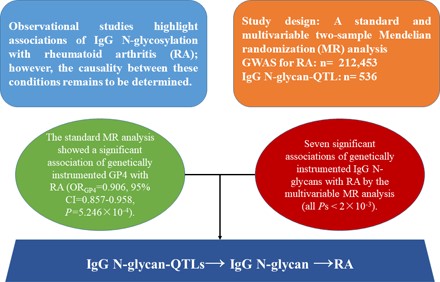-
Views
-
Cite
Cite
Di Liu, Jing Dong, Jie Zhang, Xizhu Xu, Qiuyue Tian, Xiaoni Meng, Lijuan Wu, Deqiang Zheng, Xi Chu, Wei Wang, Qun Meng, Youxin Wang, Genome-Wide Mapping of Plasma IgG N-Glycan Quantitative Trait Loci Identifies a Potentially Causal Association between IgG N-Glycans and Rheumatoid Arthritis, The Journal of Immunology, Volume 208, Issue 11, June 2022, Pages 2508–2514, https://doi.org/10.4049/jimmunol.2100080
Close - Share Icon Share
Abstract
Observational studies highlight associations of IgG N-glycosylation with rheumatoid arthritis (RA); however, the causality between these conditions remains to be determined. Standard and multivariable two-sample Mendelian randomization (MR) analyses integrating a summary genome-wide association study for RA and IgG N-glycan quantitative trait loci (IgG N-glycan-QTL) data were performed to explore the potentially causal associations of IgG N-glycosylation with RA. After correcting for multiple testing (p < 2 × 10−3), the standard MR analysis based on the inverse-variance weighted method showed a significant association of genetically instrumented IgG N-glycan (GP4) with RA (odds ratioGP4 = 0.906, 95% confidence interval = 0.857–0.958, p = 5.246 × 10−4). In addition, we identified seven significant associations of genetically instrumented IgG N-glycans with RA by multivariable MR analysis (p < 2 × 10−3). Results were broadly consistent in sensitivity analyses using MR_Lasso, MR_weighted median, MR_Egger regression, and leave-one-out analysis with different instruments (all p values <0.05). There was limited evidence of pleiotropy bias (all p values > 0.05). In conclusion, our MR analysis incorporating genome-wide association studies and IgG N-glycan-QTL data revealed that IgG N-glycans were potentially causally associated with RA. Our findings shed light on the role of IgG N-glycosylation in the development of RA. Future studies are needed to validate our findings and to explore the underlying physiological mechanisms in the etiology of RA.





